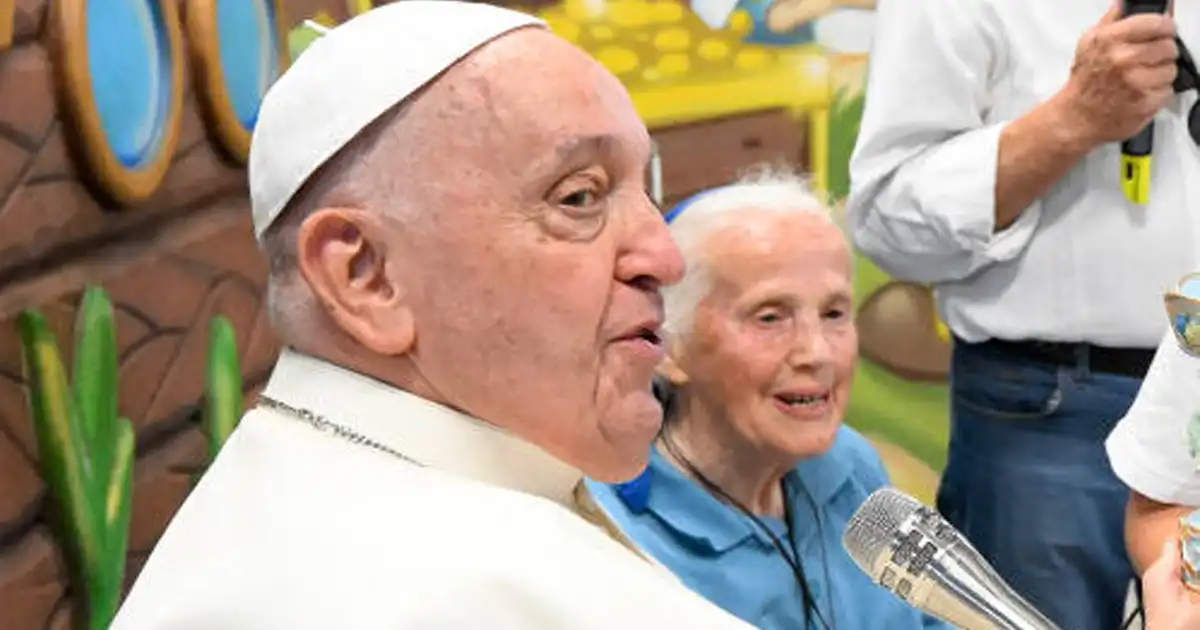The nun who wept for Pope Francis: A touching goodbye that broke Vatican tradition
Sister Geneviève Jeanningros' emotional farewell at St. Peter’s Basilica captured hearts around the world — and revealed a deep, decades-long friendship with the late Pope.
When 81-year-old Sister Geneviève Jeanningros stepped out of line to weep beside Pope Francis’ casket, it wasn’t an act of rebellion — it was a moment of pure love that moved the world.
Her quiet act broke protocol, but honored a bond built on compassion, service, and unwavering faith.
On April 23, thousands of mourners gathered at St. Peter’s Basilica to say farewell to Pope Francis, who had passed away on Easter Monday at the age of 88 after suffering a stroke. Amid the sea of solemn faces and strict Vatican protocol, one moment stood out.
Sister Geneviève Jeanningros, with a green backpack slung over her shoulder, paused by the Pope’s casket, her face wet with tears. As others moved briskly past, she lingered, letting her sorrow speak louder than any official ceremony.
Photos and videos of her quiet goodbye quickly went viral. Viewers around the world felt her heartbreak, describing it as “genuine pain” and calling it a “historic moment.”

A bond built on shared mission
The world soon learned that Sister Jeanningros was not a random mourner. Her friendship with Pope Francis dated back more than 40 years, when he was still Archbishop Jorge Mario Bergoglio of Buenos Aires.
They met through their work with marginalized communities — the homeless, circus performers, transgender individuals, and the terminally ill. They shared a belief that the Church should serve those most often forgotten by society.
Throughout his papacy, Sister Jeanningros remained close to Francis. Living simply in a caravan outside Rome with another nun, Sister Anna Amelia Giachetto, she dedicated her life to helping society’s outcasts. Every Wednesday, she would visit the Pope, often bringing friends from the streets to share a meal with him.
Their connection was not built on power or politics, but on purpose and love for humanity.
Sister Jeanningros’ life was marked by personal tragedy, too. Her aunt, Léonie Duquet, a French nun, was kidnapped and killed during Argentina’s brutal military dictatorship in the 1970s. This shared history of suffering deepened her bond with Francis, himself the son of Italian immigrants who understood the pain of exile and oppression.
Despite such heavy losses, Sister Jeanningros remained steadfast in her mission, always choosing love over bitterness — a choice that Pope Francis deeply admired.
Permission granted for a final goodbye
At first, many believed that Sister Jeanningros had broken strict Vatican rules by stepping toward the Pope’s casket. In reality, she had been quietly granted special permission — a rare honor not even world leaders received.
Her simple presence, wearing everyday clothes and carrying her backpack, spoke volumes about the life she lived: humble, service-oriented, and focused on what truly matters.
“She approached her friend just like she did every other Wednesday,” one mourner observed. “This encounter, however, proved to be different. She arrived to say goodbye, hoping to see him again in eternal life.”
A friendship that changed the Church
In a Church often criticized for being distant from real-world suffering, Sister Jeanningros and Pope Francis represented a different path. They showed that faith is not just about ceremony, but about compassion and connection.
Their story is a reminder that even within the most structured traditions, love can find a way to shine through — raw, authentic, and unforgettable.
As Sister Jeanningros stood by the casket, the world saw not just a nun mourning a Pope, but a friend mourning a friend. Her simple act of presence became one of the most powerful tributes to a man who spent his life reaching out to the overlooked and forgotten.





